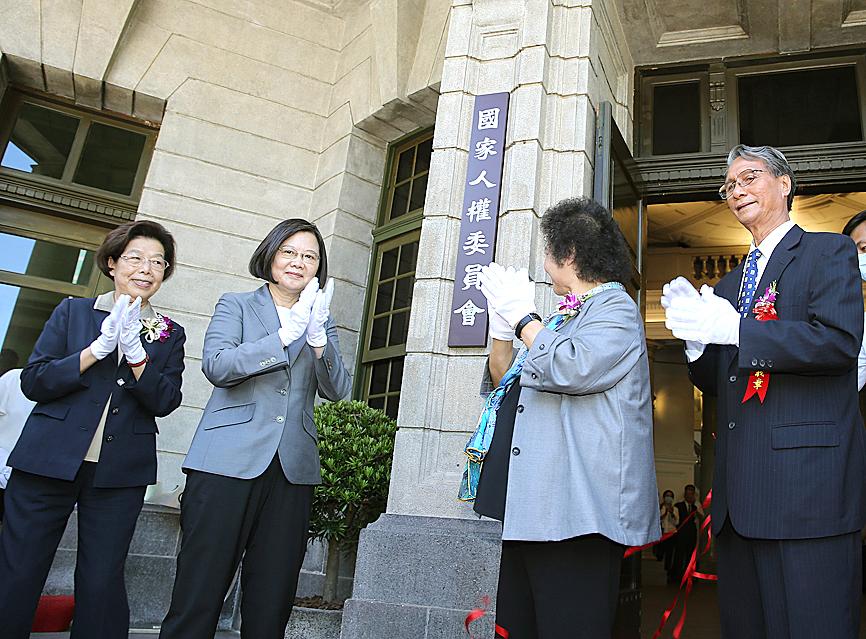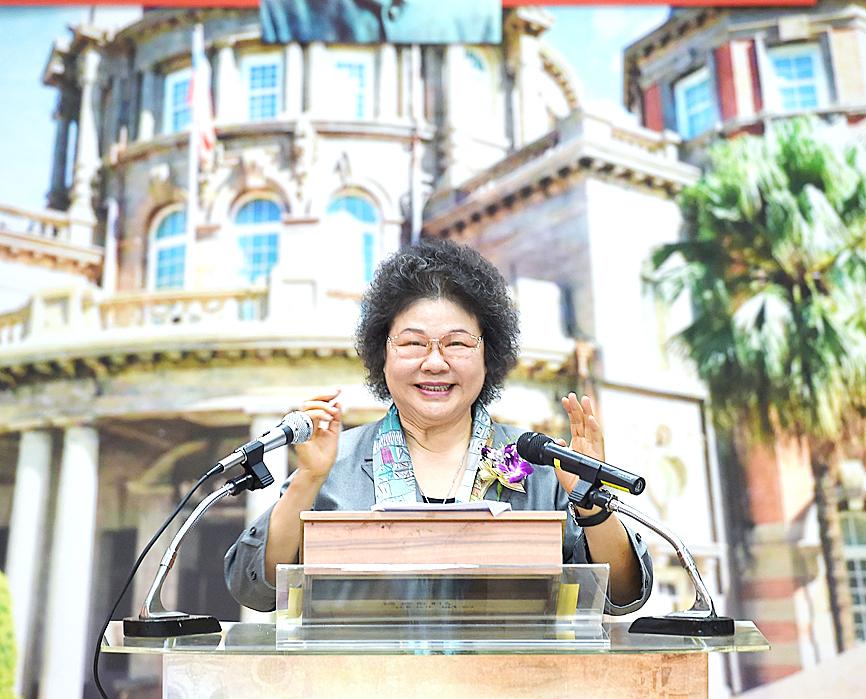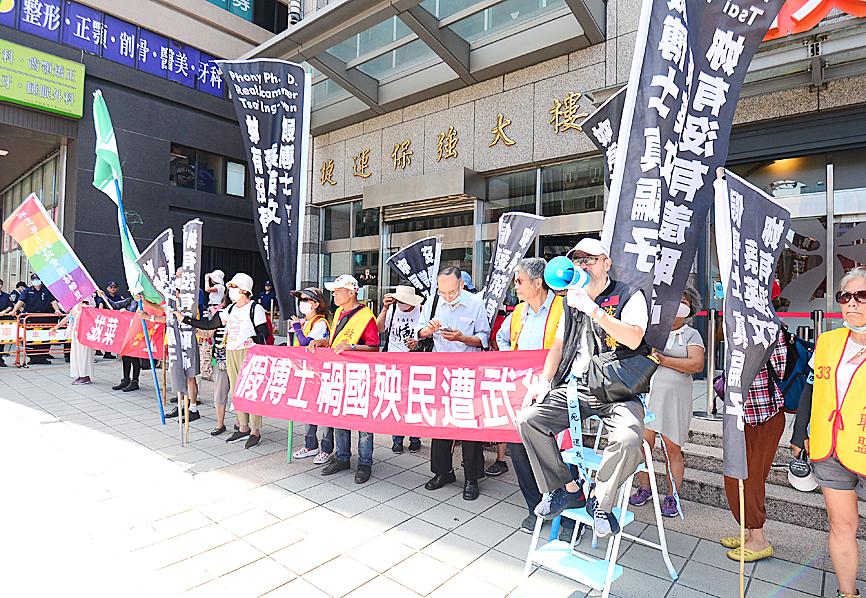President Tsai Ing-wen (蔡英文) yesterday said that she hopes the National Human Rights Commission, launched yesterday, would make a “unique contribution” to the international community by passing on the nation’s experience with promoting human rights.
Tsai made the remarks at a ceremony in Taipei to pass the position of Control Yuan president from Chang Po-ya (張博雅) to Chen Chu (陳菊).
Hailing the commission’s launch as a milestone in the nation’s efforts to protect human rights, Tsai said that the move is in line with the UN’s 1993 Principles Relating to the Status of National Institutions and signifies that Taiwan is one step closer to its ideal of “building the nation on human rights.”

Photo: CNA
The commission’s responsibilities include investigating human rights violations, researching and reviewing human rights policies, generating reports on human rights incidents, promoting human rights and engaging in international exchanges, she said, adding that the tasks should be conducted in the spirit of the Control Yuan as watchdog, while fostering local human rights institutions and instilling in residents a sense of respect toward other human beings.
Tsai said she hopes that commission members act as the nation’s conscience, exercise their authority fairly and independently, collaborate in introducing laws on the commission’s operations, interact smoothly with other branches of government, and work sustainably to improve human rights.
Even as the Legislative Yuan is to form a constitutional amendment committee in the next session, the government would press on with the goal of protecting human rights and upholding human rights to an international standard, she said.

Photo: Fang Pin-chao, Taipei Times
Civic groups have petitioned for the commission since 1998, Chen said, adding that she is both apprehensious and honored to serve as commission chairwoman.
The Presidential Office’s Human Rights Commission Consultative Committee, after adapting many international covenants on human rights to the nation, on May 19 ceased operations so that it could pass on the baton to the commission, she added.
Chen thanked all who paved the way for democracy and human rights in the nation, saying that because of their efforts, Taiwan can proudly proclaim to the international community that it is an advanced nation that values human rights.

Photo: Wang Yi-sung, Taipei Times
The commission is to be a voice for minority groups, comprehensively monitor human rights in Taiwan, consult on human rights, receive complaints on human rights infringements, offer human rights education, assess whether government policies protect human rights, and advise the Executive Yuan and Legislative Yuan on human rights legislation, she said.
Asked what human rights she hoped to bolster, Chen said that she would focus on the human rights of children, inmates and people who are mentally challenged.
Regarding her role as Control Yuan president, Chen said that she would shoulder the “historical responsibility” of transferring the branch’s functions to other agencies, while keeping the human rights commission operational even if lawmakers and the public decide to abolish the Control Yuan.

Alain Robert, known as the "French Spider-Man," praised Alex Honnold as exceptionally well-prepared after the US climber completed a free solo ascent of Taipei 101 yesterday. Robert said Honnold's ascent of the 508m-tall skyscraper in just more than one-and-a-half hours without using safety ropes or equipment was a remarkable achievement. "This is my life," he said in an interview conducted in French, adding that he liked the feeling of being "on the edge of danger." The 63-year-old Frenchman climbed Taipei 101 using ropes in December 2004, taking about four hours to reach the top. On a one-to-10 scale of difficulty, Robert said Taipei 101

Nipah virus infection is to be officially listed as a category 5 notifiable infectious disease in Taiwan in March, while clinical treatment guidelines are being formulated, the Centers for Disease Control (CDC) said yesterday. With Nipah infections being reported in other countries and considering its relatively high fatality rate, the centers on Jan. 16 announced that it would be listed as a notifiable infectious disease to bolster the nation’s systematic early warning system and increase public awareness, the CDC said. Bangladesh reported four fatal cases last year in separate districts, with three linked to raw date palm sap consumption, CDC Epidemic Intelligence

Two Taiwanese prosecutors were questioned by Chinese security personnel at their hotel during a trip to China’s Henan Province this month, the Mainland Affairs Council (MAC) said yesterday. The officers had personal information on the prosecutors, including “when they were assigned to their posts, their work locations and job titles,” MAC Deputy Minister and spokesman Liang Wen-chieh (梁文傑) said. On top of asking about their agencies and positions, the officers also questioned the prosecutors about the Cross-Strait Joint Crime-Fighting and Judicial Mutual Assistance Agreement, a pact that serves as the framework for Taiwan-China cooperation on combating crime and providing judicial assistance, Liang

US climber Alex Honnold left Taiwan this morning a day after completing a free-solo ascent of Taipei 101, a feat that drew cheers from onlookers and gained widespread international attention. Honnold yesterday scaled the 101-story skyscraper without a rope or safety harness. The climb — the highest urban free-solo ascent ever attempted — took just more than 90 minutes and was streamed live on Netflix. It was covered by major international news outlets including CNN, the New York Times, the Guardian and the Wall Street Journal. As Honnold prepared to leave Taiwan today, he attracted a crowd when he and his wife, Sanni,